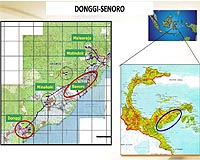 |
Khartoum, Sudan (UPI) Jan 7, 2009 The Sudanese government's appointment of an administrator of the disputed oil-rich Abyei region looks likely to intensify differences between the Arab-dominated regime in Khartoum and the rebellious tribal south. This has heightened fears the battered African state will be plunged back into what was the continent's longest civil war. The conflict erupted in 1983 and an estimated 2 million people perished, either in the bloodletting or in the associated famines. Four million people were driven from their homes in the south, causing one of the world's worst humanitarian crises. It persists to this day. Abyei was a major bone of contention and remains a flashpoint for a return to war. Under the terms of the Comprehensive Peace Agreement signed in January 2005 to end 22 years of war, Khartoum agreed to share oil revenue from the Abyei region that straddles the north-south border with the southern rebels of the Sudan People's Liberation Movement. The government's Jan. 6 appointment of Deng Arop Kuol, a hard-line figure, as administrator of Abyei "is a move to ensure that Abyei remains under the north's control," according to U.S. security consultancy Stratfor. The peace agreement is already in jeopardy because of rising tension between north and south, in large part due to the dispute over ownership of Abyei. This is expected to swell as the nation moves toward a referendum on southern independence scheduled for January 2011 and national elections, the first multiparty poll in a quarter-century, due to be held three months later. "If southern Sudan gains its independence in 2011, and takes Abyei with it, Khartoum could conceivably lose all the revenues generated from that region and with oil revenues accounting for about 95 percent of Sudan's export income as well as 60 percent of its entire income, such a loss would be significant," Stratfor observed. Sudan has oil reserves estimated at 6 billion barrels. Much of it is exported to China. Abyei produces around half of the country's output of some 500,000 barrels a day. Under the peace deal, brokered by outside powers, revenues from northern oil fields are entirely reserved for Khartoum. If the SPLM won long-cherished separation from Sudan for the 10 states that make up the south in the 2011 referendum it would likely control as much as 87 percent of the oil. The Khartoum regime of President Omar Hassan al-Bashir, who is wanted by the International Criminal Court for genocide and crimes against humanity during the civil war, still controls the country's oil fields and is clearly determined not to relinquish them. Large numbers of government troops guard the fields, and at least two have been reported to be occupied outright by the northern-controlled army. Aid organizations fear that tensions will escalate sharply ahead of the elections, boosting pressure in the south for secession, including Abyei, collapsing the peace deal and unleashing a new wave of violence. Ghazi Salaheddin, a senior adviser to Bashir, has raised the specter of renewed civil conflict unless the critical issues of sharing oil revenues, demarcating the north-south border and payment of a $30 billion foreign debt are settled. Since most of Sudan's oil fields, the nation's economic mainstay, straddle the north-south border area, the question of who owns which fields is of paramount importance. There has been a steady buildup of violence in recent months. British relief agency Oxfam reported that some 2,600 people were killed in the south in 2009, with another 350,000 driven from their homes. That was a higher toll than occurred in war-torn Darfur during the same period. Opposition figures claim Bashir is keeping the south in ferment to support his contention that the region is ungovernable. Arms are reported to be pouring across the borders from neighboring states to destabilize the south and delay the vote on separation. Oxfam and nine other major relief agencies operating in the south have appealed for increased emergency aid. "It's not too late to avert disaster, but the next 12 months are a crossroads for Africa's largest country," Oxfam's policy adviser, Maya Mailer, warned in a recent report compiled by the aid agencies.
Share This Article With Planet Earth
Related Links Powering The World in the 21st Century at Energy-Daily.com
 Indonesia to scrap gas cost recovery cap
Indonesia to scrap gas cost recovery capJakarta (UPI) Jan 6, 2009 Indonesia plans to abandon its gas cost recovery cap, amid falling oil production and failure to attract enough investors to develop new oil and gas blocks. Cost recovery refers to the scheme of reimbursing contractors for expenses incurred in the development and operation of energy assets. Indonesia, Southeast Asia's biggest oil producer, had recently adopted the practice of capping ... read more |
|
| The content herein, unless otherwise known to be public domain, are Copyright 1995-2009 - SpaceDaily. AFP and UPI Wire Stories are copyright Agence France-Presse and United Press International. ESA Portal Reports are copyright European Space Agency. All NASA sourced material is public domain. Additional copyrights may apply in whole or part to other bona fide parties. Advertising does not imply endorsement,agreement or approval of any opinions, statements or information provided by SpaceDaily on any Web page published or hosted by SpaceDaily. Privacy Statement |